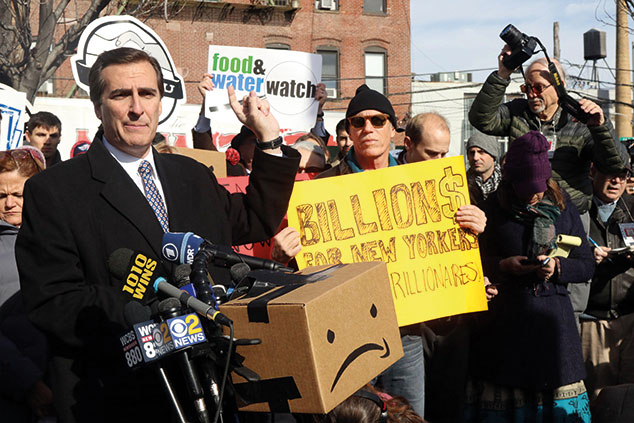
“Just what we need,” says Sarah Halzack on Bloomberg. More “drama” over Amazon’s second headquarters. Faced with “criticism” from activists and politicians over an agreement that would see Amazon get $3bn in state and city incentives to move 25,000 employees to New York, it has now decided to “explore alternatives”, says The Washington Post. Although it is unlikely to pull out immediately, the company may try to use a threat to withdraw to “put pressure” on New York.
The future of the agreement between Amazon and New York may boil down to local politics, say Joshua Chaffin and Shannon Bond in the Financial Times. The tax incentives need to be approved by the New York State Assembly, which has voted to give “effective veto power” to a three-person panel containing New York Senator Michael Gianaris, who has hitherto led what has seemed a “quixotic” campaign to block the deal. For their part, Amazon executives have been “riled” by the “local hostility”, which is in “sharp contrast” to the “loving embrace” they have received elsewhere.
Since Amazon hasn’t bought any land or signed leases, “it could back out and restart talks with some of its jilted suitors in the recent competition to host its second headquarters”, says the New York Post. However, the conversations would be “awkward”.
It looks as though the group’s decision to run a competition inviting bids from more than 200 potential locations was a ruse to hide the fact that it always planned to locate near Washington DC and New York City. Given this, politicians are right to argue that the offer made by New York’s governor and mayor were “too generous”, and should be reduced.
Amazon shouldn’t complain too much if the offer is reduced, because even the $1.2bn in tax credits alone is the equivalent of $48,000 per job, about six times more than what Morgan Stanley received between 2013 and 2015,
says Breakingviews’ Amanda Gomez. Still, New York “has a reason not to let Amazon get away too easily”, as the e-commerce giant’s plans would make it the fifth-biggest private employer in the city at a time when the Big Apple is trying to diversify away from finance. So perhaps a sensible compromise would be for both sides to agree to “halve the incentives”.
Has Amazon peaked?
It hardly helps matters that all this fuss comes at a time when “Amazon’s incredible growth machine is getting less incredible”, as Bloomberg’s Shira Ovide puts it. The latest quarter’s sales growth of 20% was the weakest in four years. While the firm is “delivering more steady and solid profits”, investors “haven’t paid a princely sum for Amazon stock all these years to have profits improve but revenue growth slow sharply”. They will be unnerved and wondering where “the beast that has sent shudders into every corner of the corporate world” has gone.
CMA delays grocery game-changer verdict
Sainsbury’s and Asda shareholders will have to wait a little longer to learn whether the two companies can merge. The Competition and Markets Authority (CMA) has delayed its final decision until 30 April, citing the complexity of the investigation, says The Daily Telegraph. The £12bn merger aims to create the UK’s largest supermarket group, eclipsing Tesco with almost a third of the market and more than 2,000 stores.
If the deal is approved it could be “a grocery industry game-changer”, says Deirdre Hipwell in The Times. The two companies claim the combination would result in an “innovative, large-scale group with serious buying power”, generating lower prices for customers. They also insist the deal is necessary to enable them to compete on level terms with “gargantuan” firms such as the German discounters Aldi and Lidl, who are able to benefit from “European-wide buying”.
What absolute nonsense, says Neil Collins in the Financial Times. The grocery market is already concentrated: the top-five supermarkets already control nearly 70% of the market, and the proposed merger is nothing more than a particularly “blatant attempt” to reduce competition even further.
Special pleading about competition from the “beastly Germans” and “uncheckable promises” about lower prices are “so much chop suey”.Instead of delaying the decision, the merger presents “an early opportunity” for the CMA’s chairman Andrew Tyrie to follow the example of Europe, and “show his teeth” by stopping “this clear cut in competition”.
City talk
► The “major profit warning” issued by spread-betting group Plus500 is another reminder that “if it looks too good to be true, it probably is”, says Russ Mould of
AJ Bell. Despite tougher new European regulations governing high-risk contracts for difference, which were always likely to hamper the whole sector, the company had issued a “series of statements” that kept insisting it would beat earnings forecasts. Now the investors “sucked in by the euphoria around its bullish trading statements” have lost a third of their stake.
► “All the truly great department stores began as personal fiefdoms, and had most success” under “private ownership,” says Matthew Vincent in the Financial Times. Debenhams is no exception. The shares have fallen by 98% since its 2006 listing. The latest twist in this saga is £40m worth of extra bank credit, to “buy more time” for a £500m refinancing. The news boosted the shares by 40%, but the bounce won’t last: any refinancing “must involve some form of equity fundraising that greatly dilutes all holdings”.
► Getlink (Eurotunnel’s Paris-listed parent) is suing the government for the decision to exclude it from bidding for contracts to provide extra cross-channel capacity in the event of a no-deal Brexit. Quite right too, says The Independent’s James Moore. Transport secretary Chris Grayling’s decision to hand a £13.8m contract for the backup service “to a ferry company that didn’t have any ferries and copied its terms and conditions from a pizza delivery business” was
taken with “malevolent incompetence”. Given the government’s behaviour, nobody would partner with it today without “some guarantees written in blood”.